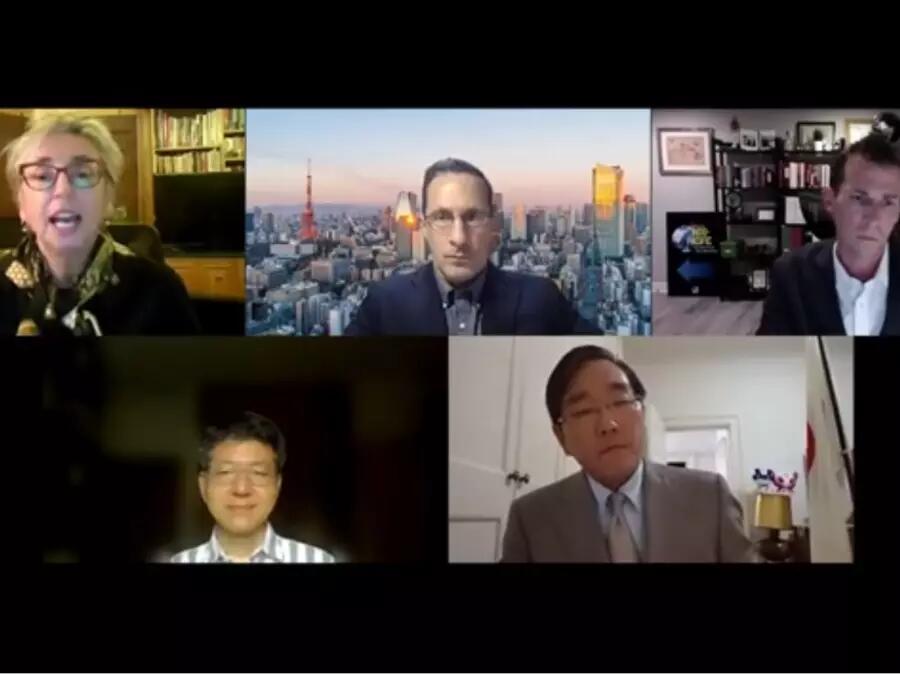
Event Report: Security in East Asia in Light of the Growing Influence of China and Current Japan-China Relations
On September 21st, 2021, TAKAHARA Akio, Professor of Contemporary Chinese Politics at the Graduate School of Law and Politics and the Graduate School of Public Policy, University of Tokyo, delivered a lecture on his research on security in East Asia in light of the growing influence of China and current Japan-China relations. This online webinar was sponsored by the Consulate General of Japan in Toronto and began with opening remarks from Consul-General SASAYAMA Takuma.
Professor Takahara’s presentation covered details on how China has increased its national power at remarkable speed. Roughly 80% of elite respondents in ASEAN states feel that China is the most influential economic power in Southeast Asia. However, a majority also express anxiety about this economic influence. Professor Takahara noted the gap between China’s soft words and its tough deeds, drawing on the example of its construction of artificial islands in the South China Sea. He explained that “the gap stems from a variety of factors, including the vision of a Pax Sinica that is not based on rules (i.e. a mere extension of the internal Pax Communista), China’s idea of the “blue national territory” (characteristic of a continental power), the “big power syndrome” which involves self-righteousness, the personal tendency of the top leader, etc.”
The presentation also focused on the complexity of Japan-China relations. Professor Takahara argued that Japan needs a comprehensive approach that draws on factors such as “domestic politics; economic interests; international environment and security; and people’s emotions, perceptions and identity.” Although negative perceptions towards China can be seen within the Japanese population, economic exchange and tourism continue to be a factor that promotes positive relations between the two countries. Professor Takahara concluded the presentation by stating that competition will intensify even while cooperation deepens between China and Japan. Japan’s two-pronged approach to strike a balance between competition and cooperation will become increasingly difficult but vital for Japan-China relations.
Following the presentation, Professor Takahara was joined by Mr. Jonathan Berkshire Miller, Senior Fellow from the Japan Institute of International Affairs and Professor Stephen Nagy, Senior Associate Professor from the Department of Politics and International Studies at the International Christian University, for a discussion. The panel was moderated by Ms. Deanna Horton, Senior Fellow of the Munk School of Global Affairs & Public Policy at the University of Toronto. Both Mr. Miller and Professor Nagy spoke about the implications of Professor Takahara’s presentation for Canada’s relations with China and its Indo-Pacific strategy. One observation was that there are lessons that Canada can learn from Japan’s relations with China, such as adopting a more regional approach and strategy.
We would like to thank Professor TAKAHARA Akio, Mr. Jonathan Berkshire Miller, Professor Stephen Nagy and Ms. Deanna Horton for the robust discussion, as well as the virtual audience that was in attendance from around the globe for an engaged Q&A session.
The full webinar is available for viewing from THIS LINK.
About the Panel:
Presenter: Takahara Akio (Professor, Contemporary Chinese Politics at the Graduate School of Law and Politics and the Graduate School of Public Policy, University of Tokyo)
Panelists:
Jonathan Berkshire Miller (Senior Fellow, Japan Institute of International Affairs, Director & Senior Fellow on Indo-Pacific, Macdonald Laurier Institute, Senior Fellow, Asian Forum Japan, Director, Council on International Policy)
Stephen Nagy (Senior Associate Professor, Department of Politics and International Studies, International Christian University)
Deanna Horton (Senior Fellow, Munk School of Global Affairs & Public Policy, University of Toronto) (moderator)

